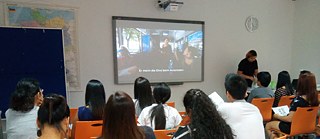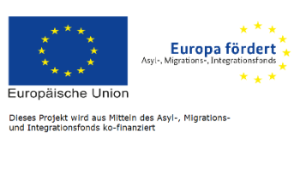For love or work: the journey into the unknown

Migrants start to prepare for a life in Germany long before joining an integration course. The Goethe-Institut in the countries of origin has a key role to play in these preparations. One example is the “Pre-Integration in the South-East Asian Region” project, which runs until the end of 2017.
By Janna Degener-Storr
hen Siriwimon Wannakham from Thailand met her future husband, a German, she realised very quickly that she wanted to live with him. So she attended language classes at the Goethe-Institut in order to qualify for a German visa and then joined him in the Bavarian town of Unterwössen. At first, she found Germans cold and sometimes her husband’s way of speaking to her seemed harsh. But now she has learned to live with the cultural differences, although she still misses her children, who stayed behind with their extended family in Thailand.Like Siriwinom, Nguyen Thi Thu could not speak German and knew little about life in Germany when she first began to think about migrating. A trained nurse in her native Vietnam, she was unable to find work in her chosen profession. Then she found out from the Internet that care assistants were needed for the elderly here in Germany, so she moved to Berlin to train for a career in geriatric nursing. She has been living and working here for the past three years.
Information services for immigrants
Anyone wishing to find out more about Siriwimon and Nguyen and their lives in Germany will find a wealth of information on the Goethe-Institut’s website, including video clips in which they and other migrants from South-East Asia talk about their daily lives – about work, partners, friends and neighbours, the weather, food and the festivals celebrated throughout the year. The information was compiled especially for people from South-East Asia who are preparing to migrate to Germany. Other online offers, such as Facebook pages, blogs, apps and webinars, were also developed by the Goethe-Institut as part of its “Pre-Integration in the South-East Asian Region” project, in order to give prospective migrants an easy way of gaining a realistic impression of life in Germany.The project also offers these people the opportunity to access no-cost advice, information events and seminars on daily life and work in Germany – whether or not they are taking a language course at the Goethe-Institut or have registered for an examination. “Many migrants from South-East Asia have no idea what life is like in Germany. In the advice sessions, some of them ask us fairly general questions about what to expect in this foreign country. Others have specific concerns: for example, they ask how to prepare for the A1 examination, how long their visa allows them to remain in Germany, and what kind of occupational training will enable them to find work here. Not all of the participants know how to use the Internet and many don’t understand the information they find on the Embassy website, for example. And some have individual questions which aren’t answered there,” explains Thanh Huong Nguyen, who coordinates the project at the Goethe-Institut in Hanoi and conducts the advice sessions in person or by telephone or e-mail. Seminars are also available to teach migrants how to avoid cultural misunderstandings or handle tricky situations in Germany, for example.
Pre-integration: part of the Goethe-Institut’s remit
Since 2007, spouses from non-EU countries who wish to join their partners in Germany have been required by law to demonstrate that they have reached the A1 level of proficiency in German before they enter the country. This has created a new target group for the Goethe-Institut in the countries of origin – one which generally consists of people with less experience of learning and less prior knowledge. Since 2008, in addition to language courses and examinations, pre-integration training and projects to facilitate the transition to the integration course have been available in South-East Asia, but also in Turkey and South-East European countries, funded initially by the European Integration Fund (EIF) and since 2014 by the Asylum, Migration and Integration Fund (AMIF). “Our priority is, ideally, to support the participants until they are able to access the services for migrants in Germany,” explains Andrea Hammann, who manages the Pre-Integration Project at the Goethe-Institut’s Head Office in Munich. Since 2013, these offers have also targeted nurses and academics in medical and technical disciplines who wish to work in Germany.The current project, entitled “Pre-Integration in the South-East Asian Region”, was co-financed by the Asylum, Migration and Integration Fund from 2014-2017. The project specifically targets prospective migrants from Indonesia, Thailand, Vietnam, Philippines, Myanmar and Cambodia who wish to work or join a spouse in Germany. Last year, around 7,500 people in the core target group attended the classroom-based courses within the project framework; according to a recent evaluation, they found the experience very enriching. The online offers are accessed by around 700,000 users each year.
Positive feedback from project participants and staff
In a quantitative survey, the vast majority of respondents who made use of these services from the Goethe-Institut (96 per cent) said that they felt very well-prepared or well-prepared for their move to Germany. 63 per cent of respondents said that the services were very helpful, and a further 37 per cent described them as generally helpful, making use of them as the main source of information alongside general Internet research. In qualitative interviews, too, the respondents (former users of the Goethe-Institut’s services) said that they had obtained most of their information about Germany from the Goethe-Institut and that the orientation courses were particularly helpful while they were settling in. Felix Warneke coordinates the project at the Goethe-Institut in Bangkok and believes that the findings confirm his view: “For people from rural regions in particular, it is a massive step to apply for a German course in the capital city and then to move to Germany. Many of them have no idea that a German supermarket is only open at specific times or that the sun rarely shines during a German winter. So it is impossible to overstate the importance of our pre-integration work. The services equip the users with essential knowledge, but they also gain a sense that they still have a lot to learn.” The Goethe-Institut is now looking to launch follow-up projects, which among other things will provide training for project staff, ideally in cooperation with front-line migration advisory services and youth migration services in Germany, and also increase the availability of Goethe-Institut services in rural areas.Funded by:
